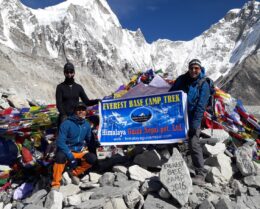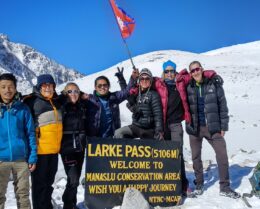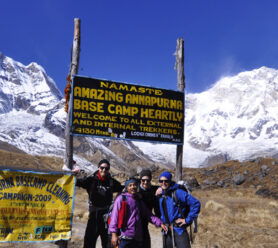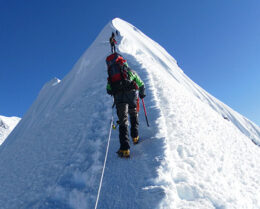FAQs
Q. Who is our guide and is he trained?
This is a Himalaya Guide Nepal Pvt. Ltd./organize and lead to the mountain. Yes, of course, 24 years of experience in the Nepali Himalayas as well as a government-registered trekking company and guide and strong mountain potter team for any trip to make fruitful during your holiday in Nepal.
Q. When is the best season for trekking?
The best time for the trekking season in Nepal is late September to November which is the highest season for a trek in Nepal and March/April/May but December/January and February are snow season/cold season too and June/July and August are rainy seasons this time to rain, muddy way but we can do the short trek as well as we can organize long trekking too, according to clients interest.
Q. What is Tea House Trekking?
Teahouse trekking is a very popular and well-developed area where we can spend in good accommodation lodging, flooding with many items on the menu as a western dish and Nepali Dal Bhat (Rice, Vegetable Curry, Lentil, Pickle, etc) and those trekking regions Annapurna, Everest, Manaslu, Langtang, and many other regions to explore in trekking.
Q. What is Camping Trek?
Camping trekking means making a full camp, taking everything for the whole trip and we can buy some things along the trek, I mean taking full staff such as Guide, Sherpa, Cook, and Some Porters to carry all the food for the full days of camping trek where trekking gear, personal things of clients and cooking ourselves for breakfast, lunch, and dinner is prepared hot and delicious meals during the trek.
Q. what about the homestay trek?
Homestay trekking means staying in local houses and community lodges if they have any and providing local food that they have available. There will be a guide and porter to carry your bag and that is a great time to study about their real-life of the country site of people.
Q. What types of accommodations do we get during the trekking?
There are four kinds of accommodation a) sleep on the floor (if you go home stay trekking), b) Dormitory (if there is less accommodation and less touristy areas), c) Normal common room that means no private bathroom but a separate room and d) Some places we can get Separate room as well as attach bathroom too.
Q. What is Food like?
You can get different kinds of western food along the trek not the same as in a city place but the taste will be a different flavor and they cook their style as well as locally.
Q. What do we do for Drinking water?
Along the trek, you can get mineral water to drink if it is not you can drink boiled water and spring water by using iodine or water-purifying tablets. Recommend drinking 4-5 liters a day.
Q. What equipment do I need for trekking?
- Sun Hat
- Monkey hat(it means worm one to protect your head from cold)
- Headlight
- Sun Cream/lip Bam
- Sunglasses
- Toothpest/Brush/soap
- Gloves
- Down Jacket
- Long-sleeved shirt
- Jumper/fleece jacket
- T-shirt
- Long underwear
- Windbreaker trouser
- Wind paints
- Towel/Toiletries
- Wool socks
- Cotton socks
- Trekking boots
- Sewing kits
- Water bottle
- Swiss knife
- Extra batteries
- Flip flops
- Raincoat
- Rucksacks
- Sleeping Bag
- Medical & first aid kit
Q. Can I hire and buy equipment in Nepal?
Yes, there are many trekking shops in Thamel Kathmandu to buy and rent equipment that you like such as sleeping bags, down jackets, and rucksacks and if you go through the Pokhara site you can hire and buy there too. You should take equipped equipment for trekking.
Q. What is the weather like?
It is quite difficult to weather forecast this global warming but morning and night generally cold when the sun rises then warm and during the day it is ok sometimes time wear a T-shirt. Trekking in the winter season most of the hills look like mountains and in the spring season March/April paradise of rhododendron due to blooming. The temperature in trekking Nepal is 20 degrees centigrade to - 10 degrees centigrade + during the winter season.
Q. How much for the trip cost?
The amount of Cost depends on the trekkers because we organize the Budget trip, Standard trip, and deluxe trip. We offer the best trip you prefer.
Q. What is the system of payment?
You can pay whatever is easier for you but 20% advance and the rest of them when you are in Kathmandu Nepal.
Q. What do we do about altitude sickness and emergency cases during the trek?
We have a trained guide who knows the altitude sickness and emergencies, in case it happens. We do not panic if you get any altitude symptoms and all the time we carry first aid kits for normal problems with different types of medicine but if it does not recover we should go a few hundred meters down from where you are but worse and worse case we have to fly out from that place all organized by your guide. So, that is important if we have travel insurance or a policy number it helps to cover the flight cost.
Q. How can we respect the local people, culture, and wildlife?
- Take permission before taking photos.
- If they say No, respect them not taking photos.
- Avoid wearing revealing clothes and avoid outward displays of physical affection.
- Do as a Nepali does.
- Do not disturb wildlife.
- Do not damage or remove any plants.
- Do not purchase animal parts and antiques.
Q. How can we arrange transportation in Nepal?
When you are in Nepal No worries, we can arrange all transportation if we are together if not we will provide information about transportation and the location where you go.
Q. Is there Telephone access along with the trekking?
In most of the trekking parts, you can get telephone service to communicate with your family members and more popular/ well-developed trekking regions have internet access too.
Q. Can we ask a question on the trek?
Well, feel free to ask any question along the trek on different topics with your guide, and have been trained to provide information when they are trekking.
Q. Can we extend the trek if we want?
Yes, of course, you can extend days of trekking, and discussing with your team and you can do site trips as well such as hiking, rafting, jungle safari, mountain flight,s and much more that we have in Nepal.
Q. Is it a possible side trip before and after the trek?
Wow, it is a very good question, yes it would help your trekking if you do hiking before the trek and you can do a site trip if you have time after trekking like white rafting, jungle safari, mountain flight, etc.
Q. Can I leave feedback end of the trek?
End of the trek sure you are well come to chat with a hot dinner and write your feedback on the whole trekking experience and guide and helper. You can write your feedback through an email too. Your comments are valuable for our team and Himalaya Guide Nepal is always happy to provide the best service and to collect your valued feedback.




